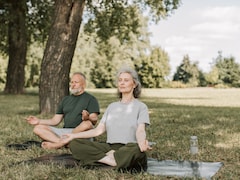Understanding the connection between stress and skin health can help individuals take better care of their skin and overall well-being. Let's explore how stress affects skin and ways to combat skin issues.

How Does Stress Impacts Your Skin Health; Lets Find Out
Stress is a natural response to daily challenges, but chronic stress can have harmful effects on overall health, including the skin. Studies suggest that stress triggers hormonal imbalances, weakens the skin's barrier, and accelerates aging. According to the American Academy of Dermatology (AAD), stress increases cortisol levels, leading to inflammation, breakouts, and premature wrinkles. Moreover, stress-related habits like poor sleep and unhealthy eating further damage the skin. Understanding the connection between stress and skin health can help individuals take better care of their skin and overall well-being. Let's explore how stress affects skin and ways to combat skin issues.
How does stress impact your skin health
When the body is under stress, it releases cortisol, a hormone that triggers inflammation and disrupts skin function. This hormonal surge can lead to various skin issues, from acne to premature aging. Here are some ways stress impacts skin health.
1. Triggers acne and breakouts
Stress stimulates oil glands to produce more sebum, clogging pores and causing acne. The AAD states that stress acne is common in both teenagers and adults.
2. Accelerates aging and wrinkles
Chronic stress damages collagen and elastin, essential proteins that keep skin firm and youthful. The National Institutes of Health (NIH) reports that prolonged stress leads to fine lines, wrinkles, and sagging skin.
3. Causes skin dryness and dullness
Stress weakens the skin barrier, reducing moisture retention. This results in dehydrated, dull-looking skin that lacks a healthy glow.
4. Triggers skin conditions like eczema and psoriasis
According to the National Eczema Association, stress is a major trigger for flare-ups in people with eczema and psoriasis, causing redness, itching, and inflammation.
5. Leads to under-eye dark circles
Stress often disrupts sleep patterns, leading to dark circles and puffiness under the eyes. Poor sleep also reduces the skin's ability to repair itself overnight.
6. Causes redness and increased sensitivity
High cortisol levels dilate blood vessels, leading to redness, irritation, and increased skin sensitivity. People with rosacea may experience worsened symptoms during stressful periods.
How to protect skin from stress damage
While stress is unavoidable, adopting healthy habits can help maintain skin health. Here are some expert-recommended skin health tips.
1. Practice stress management techniques
Meditation, deep breathing, and yoga can help reduce stress hormones and promote glowing skin. The World Health Organisation (WHO) emphasises the importance of mindfulness for overall well-being.
2. Get quality sleep
Aim for 7-9 hours of sleep to allow the skin to repair and regenerate. The Sleep Foundation recommends maintaining a consistent sleep schedule for better skin health.
3. Maintain a balanced diet
Eating antioxidant-rich foods like fruits, vegetables, and nuts helps combat oxidative stress. Omega-3 fatty acids, found in fish and flaxseeds, also support healthy skin.
4. Stay hydrated
Drinking plenty of water keeps the skin hydrated and flushes out toxins, reducing breakouts and dryness.
5. Follow a proper skincare routine
Use gentle, non-comedogenic skincare products to cleanse, moisturise, and protect the skin. Incorporate sunscreen daily to prevent stress-related skin damage.
6. Exercise regularly
Physical activity improves blood circulation, delivering oxygen and nutrients to the skin while reducing stress levels.
Stress plays a significant role in skin health, contributing to acne, wrinkles, dryness, and inflammatory skin conditions. By managing stress through sleep, diet, hydration, and self-care, individuals can protect their skin and maintain a youthful, radiant complexion. Adopting a healthy lifestyle and stress-reduction techniques is key to achieving long-term skin health.
Disclaimer: This content including advice provides generic information only. It is in no way a substitute for a qualified medical opinion. Always consult a specialist or your own doctor for more information. NDTV does not claim responsibility for this information.
DoctorNDTV is the one stop site for all your health needs providing the most credible health information, health news and tips with expert advice on healthy living, diet plans, informative videos etc. You can get the most relevant and accurate info you need about health problems like diabetes, cancer, pregnancy, HIV and AIDS, weight loss and many other lifestyle diseases. We have a panel of over 350 experts who help us develop content by giving their valuable inputs and bringing to us the latest in the world of healthcare.














